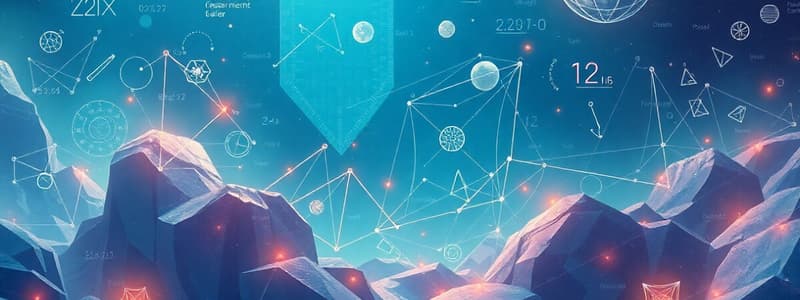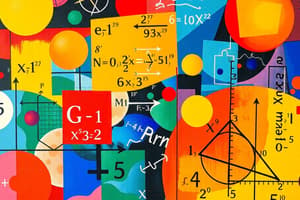Podcast
Questions and Answers
What is the main purpose of proofs in mathematics?
What is the main purpose of proofs in mathematics?
- To simplify complex problems into basic arithmetic
- To provide a collection of unproven statements
- To logically demonstrate the truth of mathematical statements (correct)
- To create algorithms for computer programming
How does applied mathematics differ from pure mathematics?
How does applied mathematics differ from pure mathematics?
- Applied mathematics is more theoretical than pure mathematics
- Applied mathematics addresses real-world problems using mathematical principles (correct)
- Applied mathematics is focused primarily on abstract concepts
- Applied mathematics seeks to develop purely theoretical theories
Which of the following statements accurately describes mathematical notation?
Which of the following statements accurately describes mathematical notation?
- It is a casual way to express mathematical ideas
- It is only used in advanced mathematics courses
- It is a standardized system for representing mathematical concepts symbolically (correct)
- It eliminates the need for logical reasoning in math
What role do axioms play in a mathematical system?
What role do axioms play in a mathematical system?
In what ways can mathematics be applied in everyday life?
In what ways can mathematics be applied in everyday life?
Which branch of mathematics primarily deals with continuous change and motion?
Which branch of mathematics primarily deals with continuous change and motion?
What type of numbers include both positive and negative whole numbers, as well as zero?
What type of numbers include both positive and negative whole numbers, as well as zero?
Which mathematical discipline involves the study of shapes such as triangles and circles?
Which mathematical discipline involves the study of shapes such as triangles and circles?
What is primarily focused on collecting, analyzing, and interpreting data?
What is primarily focused on collecting, analyzing, and interpreting data?
In which branch of mathematics do variables represent unknown quantities?
In which branch of mathematics do variables represent unknown quantities?
What mathematical objects represent relationships between sets of inputs and outputs?
What mathematical objects represent relationships between sets of inputs and outputs?
Which branch of mathematics is used extensively in computer science and involves countable objects?
Which branch of mathematics is used extensively in computer science and involves countable objects?
Which type of numbers includes fractions and is represented as the ratio of two integers?
Which type of numbers includes fractions and is represented as the ratio of two integers?
Flashcards
Mathematics
Mathematics
The study of numbers, quantities, and shapes along with logic and reasoning.
Arithmetic
Arithmetic
Branch focusing on basic operations: addition, subtraction, multiplication, and division.
Algebra
Algebra
Introduces variables and equations to represent unknown quantities.
Geometry
Geometry
Signup and view all the flashcards
Calculus
Calculus
Signup and view all the flashcards
Statistics
Statistics
Signup and view all the flashcards
Functions
Functions
Signup and view all the flashcards
Geometric Shapes
Geometric Shapes
Signup and view all the flashcards
Engineering
Engineering
Signup and view all the flashcards
Proofs
Proofs
Signup and view all the flashcards
Axioms
Axioms
Signup and view all the flashcards
Pure Mathematics
Pure Mathematics
Signup and view all the flashcards
Applied Mathematics
Applied Mathematics
Signup and view all the flashcards
Study Notes
Foundational Concepts
- Mathematics is a broad field studying numbers, quantities, and shapes. It uses logic, reasoning, and patterns to understand abstract relationships.
- Core areas including arithmetic, algebra, geometry, calculus, and statistics build on each other, with advanced topics relying on fundamental principles.
- Many mathematical systems exist based on unique axioms and theorems allowing for rigorous, logical proofs.
Branches of Mathematics
- Arithmetic: Basic operations (addition, subtraction, multiplication, division) and concepts like prime numbers, fractions, decimals, and percentages.
- Algebra: Introduces variables and equations to solve problems with changing or unknown quantities.
- Geometry: Studies shapes and their properties: lines, angles, triangles, circles, etc. Examining spatial relations and measurements.
- Calculus: Handles continuous change and motion using concepts like limits, derivatives, and integrals, crucial for physics, engineering, and economics.
- Statistics: Collects, analyzes, and interprets data with descriptive (tables, graphs, averages) and inferential (hypothesis tests, sampling) methods.
- Discrete Mathematics: Deals with countable objects (sets, graphs, algorithms) used in computer science.
Key Mathematical Objects
- Numbers: Natural numbers, integers, rational numbers (fractions), irrational numbers like π and √2, and real numbers.
- Sets: Collections of objects using concepts like union, intersection, and subsets.
- Functions: Connections between input and output sets, a vital aspect of mathematics.
- Equations: Statements asserting the equality of expressions. Solving equations is central to algebra.
- Geometric Shapes: Two- and three-dimensional figures with properties like area, volume, and angles.
Applications of Mathematics
- Science: Mathematical models understanding and predicting natural phenomena.
- Engineering: Essential for designing structures, machines, and systems.
- Computer Science: Crucial for algorithms, data structures, and software development.
- Economics and Finance: Models market behavior, optimizes investments, and aids decision-making.
- Social Sciences: Analyzes data and trends.
- Everyday Life: Used in common tasks like budgeting, cooking, and measuring.
Key Mathematical Principles
- Proofs: Logical arguments validating mathematical statements, central to rigorous thinking.
- Axioms: Unproven statements foundational to mathematical systems.
- Theorems: Proven statements deriving from axioms and other theorems.
- Abstraction: Simplifying complex problems to key elements.
- Logic: Reasoning to conclude from premises, fundamental to mathematical proofs.
- Problem-Solving: Formal and informal processes for finding solutions and understanding underlying ideas.
Different Types of Mathematics
- Pure Mathematics: Focuses on developing theories based on abstract concepts and relationships.
- Applied Mathematics: Uses mathematical principles to solve real-world problems in areas like engineering and physics.
Mathematical Notation
- A standardized system using symbols to represent mathematical objects and relationships.
History of Mathematics
- A long, diverse history with contributions from various cultures and individuals across time.
- Early civilizations used mathematics for tracking time, surveying land, and solving practical problems.
Studying That Suits You
Use AI to generate personalized quizzes and flashcards to suit your learning preferences.



